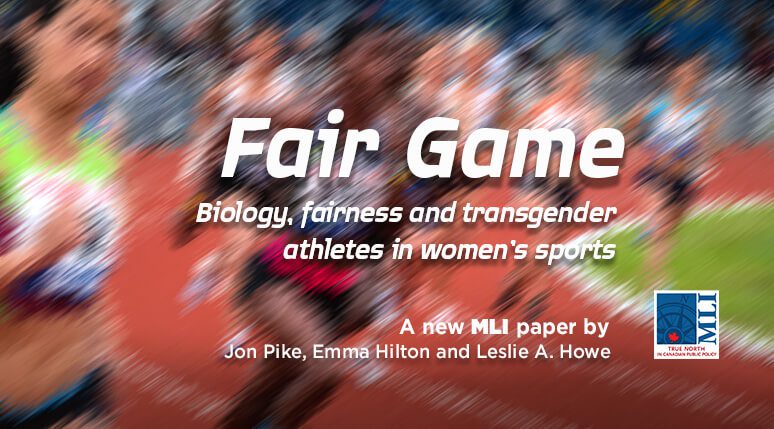 A new report lays out the physical advantages of athletes who are born male, and rejects gender-based criteria for competition, proposing instead two categories (“open” and “female”) to allow all athletes to compete fairly.
A new report lays out the physical advantages of athletes who are born male, and rejects gender-based criteria for competition, proposing instead two categories (“open” and “female”) to allow all athletes to compete fairly.
OTTAWA, ON (December 7, 2021): With the Beijing Games approaching, the International Olympic Committee (IOC) has made headlines by adopting new guidelines on the participation of transgender athletes in women’s competitions. However, the IOC and other sports bodies, including in Canada, have so far failed to ensure fairness, particularly as it concerns women athletes, while also supporting inclusion.
The science is clear: athletes who were born male but who identify as women and seek participation in women’s events have significant competitive advantages. Additionally, a thorough ethical examination finds that while inclusion is an important objective, safety and fairness should be higher priorities when it comes to sport.
In any event, gender identity (a subjective concept) is a poor basis for sports categories. It is biological sex (an objective fact) which drives the inherent differences in athletic advantage, and which makes sex-based categories in sport necessary to begin with. Numerous models for inclusion fail when examined in this light.
These are the findings of a new MLI paper titled “Fair Game: Biology, fairness and transgender athletes in women’s sport.” In the report, authors Jon Pike, Emma Hilton, and Leslie A. Howe recommend a new way to conceive of sports categories: an “open” category in which anyone can participate who wishes to, and a “female” category reserved for those born biologically female.
The authors write: “We argue for a classification system in which everyone can compete fairly and fully. This consists of age categories, sex categories, impairment categories, and sometimes weight categories. It is important to note that these categories all refer to properties of bodies, not properties of identification.”
The paper reviews the facts of human physiology and demonstrates that male advantages extend beyond size and muscle mass to an array of abilities that cover a great majority of sports. To take two examples:
- The current 55kg male record holder in weightlifting, who is 1.52m tall, lifts 29.5 percent more than the current 55kg female record holder, who is also 1.52m tall.
- The male-to-female gap in track sprinting is 12 percent. This translates into approximately 10,000 males having a personal-best 100m sprint time that is faster than the current female Olympic champion, including schoolboys, Master’s category males, Paralympic males and males whose primary sport is not track sprinting.
But even in the face of this evidence, many sporting authorities, including the Canadian Centre for Ethics in Sport, recommend that participation in women’s events should in many cases be determined by one’s self-identification as a woman, prioritizing inclusion above all else. Other recommended approaches include a requirement for testosterone suppression, though the authors of the MLI report reject this approach, as testosterone suppression does little to reduce many crucial athletic advantages which are acquired beginning at puberty. They also reject proposals for case-by-case assessments which would inevitably leave some transgender athletes out and cause discrimination.
According to the authors, “the existence of women’s sport is based on the consistent existence of male advantage… given that fairness is critical to the competition having any valid meaning as a determination of excellence, the rights of others are always implicated.”
The authors recommend a shift in the conversation around gender identity in sport. They propose a reconceptualization of sports categories, changing the “men’s” category to an “open” group, and the women’s category to an exclusive “female” group as per sex recorded at birth.
As the authors write, “the objective for us is to make sport as open and inclusive as possible… the task is to adjust how we think about and organize sport in ways that are maximally inclusive, while remaining fair and safe.”
In addition to today’s report, this summer MLI released polling results which found that most Canadians believe that the fairness of women’s competition would be compromised by the participation of transgender athletes. And for more on this issue, check out the recent MLI webinar featuring the report’s authors, top athletes and sports officials who care about these issues.
To read the full paper, click on the button below.
***
Jon Pike is a philosopher specialising in the ethics and metaphysics of sport at the Open University UK. Pike is the former Chair of the British Philosophy of Sport Association. Emma Hilton is a developmental biologist at the University of Manchester, studying aspects of human genetic disease. Leslie A. Howe is a professor in the Department of Philosophy at the University of Saskatchewan, where she has taught since 1997.
For more information, media are invited to contact:
Brett Byers
Communications and Digital Media Manager
613-482-8327 x105
brett.byers@macdonaldlaurier.ca






